 ffirs.indd i 05/02/13 2:51 PM Deep State ffirs.indd i 2/8/13 12:42 PM ffirs.indd ii 2/8/13 12:42 PM Deep State Inside the Government Secrecy Industry M A R C A M B I N D E R A N D D . B . G R A D Y ffirs.indd iii 2/8/13 12:42 PM Copyright 2013 by Marc Ambinder and D. B. Grady. All rights reserved Cover Design: Wendy Mount Cover Photograph: Joe Raedle/Getty Images; Presidential seal Sylvia Schug/ iStockphoto Published by John Wiley & Sons, Inc., Hoboken, New Jersey Published simultaneously in Canada No part of this publication may be reproduced, stored in a retrieval system, or transmit ted in any form or by any means, electronic, mechanical, photocopying, recording, scan ning, or otherwise, except as permitted under Section 107 or 108 of the 1976 United States Copyright Act, without either the prior written permission of the Publisher, or authorization through payment of the appropriate per-copy fee to the Copyright Clearance Center, 222 Rosewood Drive, Danvers, MA 01923, (978) 7508400, fax (978) 6468600, or on the web at www.copyright.com.
ffirs.indd i 05/02/13 2:51 PM Deep State ffirs.indd i 2/8/13 12:42 PM ffirs.indd ii 2/8/13 12:42 PM Deep State Inside the Government Secrecy Industry M A R C A M B I N D E R A N D D . B . G R A D Y ffirs.indd iii 2/8/13 12:42 PM Copyright 2013 by Marc Ambinder and D. B. Grady. All rights reserved Cover Design: Wendy Mount Cover Photograph: Joe Raedle/Getty Images; Presidential seal Sylvia Schug/ iStockphoto Published by John Wiley & Sons, Inc., Hoboken, New Jersey Published simultaneously in Canada No part of this publication may be reproduced, stored in a retrieval system, or transmit ted in any form or by any means, electronic, mechanical, photocopying, recording, scan ning, or otherwise, except as permitted under Section 107 or 108 of the 1976 United States Copyright Act, without either the prior written permission of the Publisher, or authorization through payment of the appropriate per-copy fee to the Copyright Clearance Center, 222 Rosewood Drive, Danvers, MA 01923, (978) 7508400, fax (978) 6468600, or on the web at www.copyright.com.
Requests to the Publisher for permission should be addressed to the Permissions Department, John Wiley & Sons, Inc., 111 River Street, Hoboken, NJ 07030, (201) 7486011, fax (201) 7486008, or online at http://www.wiley.com/go/permissions. Limit of Liability/Disclaimer of Warranty: While the publisher and the author have used their best efforts in preparing this book, they make no representations or warranties with respect to the accuracy or completeness of the contents of this book and specifi cally dis claim any implied warranties of merchantability or fi tness for a particular purpose. No warranty may be created or extended by sales representatives or written sales materials. The advice and strategies contained herein may not be suitable for your situation. You should consult with a professional where appropriate. Neither the publisher nor the author shall be liable for any loss of profi t or any other commercial damages, including but not limited to special, incidental, consequential, or other damages.
For general information about our other products and services, please contact our Customer Care Department within the United States at (800) 7622974, outside the United States at (317) 5723993 or fax (317) 5724002. Wiley also publishes its books in a variety of electronic formats and by print-on-demand. Some content that appears in standard print versions of this book may not be available in other formats. For more information about Wiley products, visit us at www.wiley.com. Library of Congress Cataloging-in-Publication Data: ISBN 978-1-118-14668-2 (cloth); ISBN 978-1-118-22580-6 (ebk); ISBN 978-1-118-23573-7 (ebk); ISBN 978-1-118-26378-5 (ebk) Printed in the United States of America 10 9 8 7 6 5 4 3 2 1 ffirs.indd iv 2/8/13 12:42 PM Sometimes, Tom, we have to do a thing in order to fi nd out the reason for it. Sometimes our actions are questions, not answers.
John le Carr, A Perfect Spy ffirs.indd v 2/8/13 12:42 PM ffirs.indd vi 2/8/13 12:42 PM For Michael and Kelly ffirs.indd vii 2/8/13 12:42 PM ffirs.indd viii 2/8/13 12:42 PM C O N T E N T S ix ftoc.indd ix 05/02/13 2:52 PM x CONTENTS ftoc.indd x 05/02/13 2:52 PM A U T H O R S N O T E This is a book about secrets, and the authors feel an obligation to be transparent about a few things. During his time in the military, author D. B. Grady (which is a pseudonym for David Brown) held a security clearance. No sensitive information he came across while serving in Afghanistan or in the United States made it into this book. In September 2012, author Marc Ambinder began consulting for Palantir Technologies LLC, an analytics company that does work for intelligence agencies and the Department of Defense, among other clients.
He was brought in to work on a specifi c project that did not require access to secrets or to classifi ed information. There was no cross-pollination; the manuscript had already been completed, and nothing in this book comes from any material gathered at Palantir. Finally, both authors wrote extensively about secrecy while writ ing this book. Weve written tens of thousands of words on the sub ject, and have collectively written more than 20,000 posts to Twitter. If one compares our body of work to this book, it is possible that we have reused phrases or metaphors to describe certain subjects. If that is the case, it is entirely unintentional.
Our brains dont compart mentalize the way that computers can. However, aside from some material about the U.S. Joint Special Operations Command that also appeared in The Command: Deep inside the Presidents Secret Army, the book is an original work in its entirety, the reporting is fresh, and the conclusions, we hope, are original. xi flast.indd xi 05/02/13 2:51 PM xii AUTHORS NOTE While researching this book we stumbled across many things that we wont be able to write about. Though we have no legal obligation to submit our work to the government before publication, we have an ethical obligation as citizens to take extreme care when writing about sensitive subjects. We shared certain chapters with a number of former senior national security and intelligence offi cials, including several former directors of intelligence agencies.
Our purpose was to learn if the publication of this book would truly jeopardize national security. After receiving the feedback, we asked ourselves whether there was a compelling reason to print the secrets in question anyway, and worked from there. We hope weve struck the proper balance. flast.indd xii 05/02/13 2:51 PM I N T R O D U C T I O N Asleep under Fire On January 5, 2011, Mike Rogers, chairman of the House Permanent Select Committee on Intelligence, had dinner with the director of the Central Intelligence Agency, Leon Panetta, in a dining room at CIA headquarters in Langley, Virginia. After dinner, Panetta asked Rogers and his staff director, Michael Allen, to stop by his offi ce. When they reached the seventh-fl oor offi ce, Panetta shut the door.
We ve got a bead on bin Laden, he told the two men. The CIA had tracked down Osama bin Laden s most trusted courier, and it turned out that the terrorist leader was holed up in an unusually constructed, well-crafted bunker-style house in a wealthy town in Pakistan just west of the Indian border. Come back in a few weeks and we ll give you the full brief, he promised. Panetta had divulged to the Republican chairman the nation s most precious secret at that timeand did so informally, and with a promise to provide more information. He did so without formally consulting the National Security Council. Over the next few months, he would fi nd a way to make sure that the entire Gang of Eight, a group of eight leaders in the House and Senate, knew about the oper ation, the intelligence behind it, and the range of options the admin istration was considering.
Rogers and Allen returned to Langley in February and took in two hours of discussion with the CIA s lead on the project. They pored over models of the compound and a variety cintro.indd 1 05/02/13 2:51 PM DEEP STATE of other intelligence, much of which remains classifi ed. A few weeks later, Panetta called Rogers to let him know that the White House had chosen the most dangerous, most potentially valuable option: a U.S. Joint Special Operations Command SEAL team would storm the compound and kill or capture bin Laden. On the Friday before the raid, Panetta telephoned Rogers on a nonsecure phone line. You know that thing I ve been talking about? he asked.
Well, there s going to be something on it soon. Rogers knew exactly what the director meant. Because the raid was successful, it is hard to determine what the reaction from Congress would have been had things gone south. On one hand, congressional partisanship had frozen the Senate in place. On the other, Rogers came to trust Panetta. And Panetta had not hid den a thing from him.
Next page
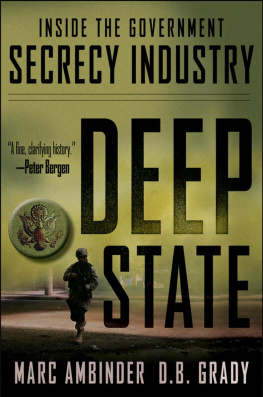
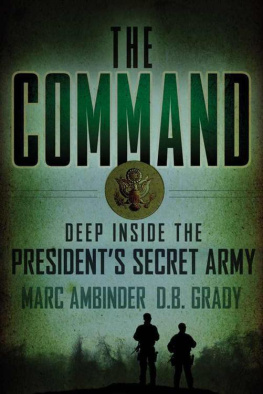
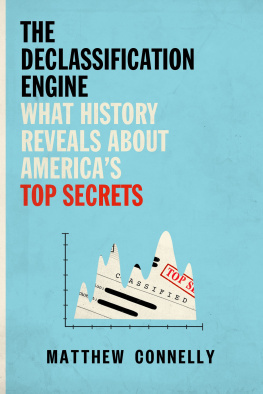



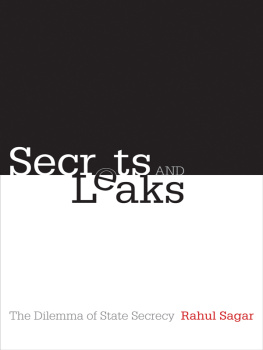
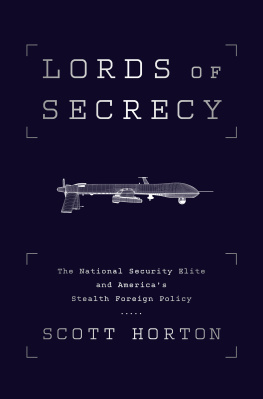

 ffirs.indd i 05/02/13 2:51 PM Deep State ffirs.indd i 2/8/13 12:42 PM ffirs.indd ii 2/8/13 12:42 PM Deep State Inside the Government Secrecy Industry M A R C A M B I N D E R A N D D . B . G R A D Y ffirs.indd iii 2/8/13 12:42 PM Copyright 2013 by Marc Ambinder and D. B. Grady. All rights reserved Cover Design: Wendy Mount Cover Photograph: Joe Raedle/Getty Images; Presidential seal Sylvia Schug/ iStockphoto Published by John Wiley & Sons, Inc., Hoboken, New Jersey Published simultaneously in Canada No part of this publication may be reproduced, stored in a retrieval system, or transmit ted in any form or by any means, electronic, mechanical, photocopying, recording, scan ning, or otherwise, except as permitted under Section 107 or 108 of the 1976 United States Copyright Act, without either the prior written permission of the Publisher, or authorization through payment of the appropriate per-copy fee to the Copyright Clearance Center, 222 Rosewood Drive, Danvers, MA 01923, (978) 7508400, fax (978) 6468600, or on the web at www.copyright.com.
ffirs.indd i 05/02/13 2:51 PM Deep State ffirs.indd i 2/8/13 12:42 PM ffirs.indd ii 2/8/13 12:42 PM Deep State Inside the Government Secrecy Industry M A R C A M B I N D E R A N D D . B . G R A D Y ffirs.indd iii 2/8/13 12:42 PM Copyright 2013 by Marc Ambinder and D. B. Grady. All rights reserved Cover Design: Wendy Mount Cover Photograph: Joe Raedle/Getty Images; Presidential seal Sylvia Schug/ iStockphoto Published by John Wiley & Sons, Inc., Hoboken, New Jersey Published simultaneously in Canada No part of this publication may be reproduced, stored in a retrieval system, or transmit ted in any form or by any means, electronic, mechanical, photocopying, recording, scan ning, or otherwise, except as permitted under Section 107 or 108 of the 1976 United States Copyright Act, without either the prior written permission of the Publisher, or authorization through payment of the appropriate per-copy fee to the Copyright Clearance Center, 222 Rosewood Drive, Danvers, MA 01923, (978) 7508400, fax (978) 6468600, or on the web at www.copyright.com.